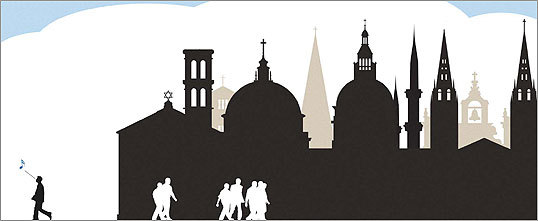
Extra! Extra! In the Ideas section of today’s Boston Globe, I’ve got a new article. Read all about it!
RELIGION CAN BE good for more than the soul, a growing number of studies seem to say. Over the past decade, academic research on religiosity has exploded, and with it has come a raft of publications suggesting that spiritual beliefs and practices can add years to life, lower blood pressure, or keep at-risk kids on the straight and narrow.
As sociologists, psychologists, and physicians turn their attention to measuring the effects of religion, often fueled by grant money from private foundations, the results have percolated swiftly through weekend sermons and the popular media. Being nonreligious, one might conclude, looks more and more like a danger to your health.
That’s right. I’ve jumped cheerfully on the religion-and-health bandwagon. But don’t worry, it gets more interesting than that. Beginning in conversations with the sociologist Phil Zuckerman several months ago, I found a pretty wide spread of folks who are actively (1) trying to bring non-religious people into the focus of quantitative sociology and psychology and (2) trying to discredit claims that religion is good for your health. This article focuses mainly on the first group.
This trend toward the non-religious is a direct reaction to the return of religion to academia in recent years. Here’s a quotation from my interview with the leading sociologist of religion Christian Smith, which I wish had made it into the article:
In the old days, among people at universities, being skeptical or being nonreligious was more taken for granted. So that was a more invisible category. The more religion has had a resurgence, if you think it has, the more being not religious has become interesting.
Comments
6 responses to “Science of the Secular”
Nathan,
I really enjoyed the piece. Thanks again for highlighting the work of my colleagues and I.
~Joe
Beautiful and provocative piece! I hope that the Globe continues to have such good taste in writers and thinkers.
it is a nonsense that religion helps you overcome your health problems or it somehow prolongs your life or religious people are more happy than non religious people the Scandinavian countries are most happiest in the world and most of people there have abandoned religion by the way richard dawkins would be furious if he reads this.
Did you see the “atheists are more intelligent” study the other week? Or rather, if you are more intelligent, you are more likely to be an atheist. So a choice (according to the nonsense data you used): either be an intelligent and unhealthy atheist, or a stupid and healthy believer.
Of course, it could be that both are nonsense…..
Jon: Yes, I did see that study (see here). My sense is that IQ-based studies are pretty flawed to begin with (see this Malcolm Gladwell piece about IQ and race). They are measuring something, but not necessarily what they claim to measure. I would be much more interested in that finding if it came with a clearer sense of what the IQ test is really measuring—most likely, acculturation, certain kinds of test-taking abilities, etc.
[…] Ticker Jo on Revolution by ReligionNathan on Science of the SecularJon on Science of the Secularmustafa on Science of the SecularAri Johnson on Science of the Secular […]